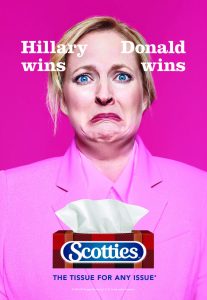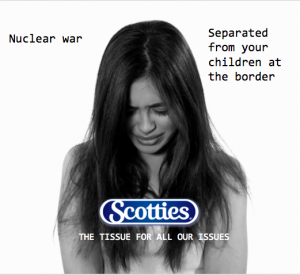Moira Wyton, GRSJ 300
Summer 2018
The ad I’ve chosen, which advertises Scotties tissues, focused on laughing at an implied farce of an American election when it ran in the months leading up to the 2016 presidential election in the United States. In order to sell its product, Scotties implies with the ad that passersby are going to cry equally and regardless of the results of the November election, depending on if Hillary Clinton or Donald Trump won. The crying woman is notably white, middle-aged and seems affluent as she wears an all-pink suit, button-up and tie behind the tissue box.

When I saw this ad on the SkyTrain in 2016, I was surprised by how it assumed that Canadians or at least viewers in Canada would see the election rather neutrally, or perhaps be critical of both candidates equally. As well, it also suggests that both candidates would give anyone equal reason to cry, but the choice of the race and gender of the ad’s figure highlights the fact that many are not as worried about Trump as others. White women overwhelmingly voted for Trump in 2016, and affluent white women like the ad depicts are more privileged and protected from the impacts of Trump’s tax cuts, attacks on abortion rights and attempts to limit the rights of sexual assault survivors in court than women of other races, abilities, incomes or sexual orientations. In the slogan, “The tissue for any issue,” it is suggested that the consumer of such an ad is privileged and affluent enough to see either candidate’s win as a negative, when I would argue that such is not true for those more vulnerable to Trump’s enacted policies. In essence, the ad assumes a sense of apathy or even passive amusement with American politics on behalf of Canadians where it was shown, but in doing so sells only to those consumers who are less vulnerable to political decisions than many Americans.

In my jammed image, I aimed to focus on the assumption that the white female subject was privileged enough to be apathetic or equally upset at either a Clinton or a Trump win by highlighting one issue which has since threatened us all more keenly as well as another policy that has disproportionately affected women of colour fleeing domestic and gang violence in Central and South America. By changing the subject to a young Latina woman, I aimed to amplify the specific struggles of Hispanic individuals under the Trump administration. However, by using nuclear war as another issue, I focused on the universality of many of the issues brought up by this administration as well that does not risk universalizing apathy or privileged removal as the previous ad did. This was further reinforced by changing the slogan to “The tissue for all our issues,” therefore creating a sense of common urgency and concern for the issues mentioned.
In a sense, this jammed ad subverts the original message by highlighting the privilege that Scotties used to market to a certain demographic, as well as the dangerous political assumption that either way one would be sad. The assumptions of the original ad relied on the affluence of consumers to sell, but the jammed ad highlights the struggles of an extremely vulnerable group and creates a sense of common responsibility and empathy for how this election has impacted Americans of all walks of life and people around the world. By jamming this ad, complacency and Canadian privilege are replaced by issues of genuine concern to all and the amplification of the pressing struggles of young migrant women. The jammed ad becomes activism while its previous version merely capitalized on the privileged sentiment that we’re all going to be fine in the end. The universalism of such an insinuation is false, and the jammed ad highlights the existential and community-specific threats of many Trump administration policies enacted to date.